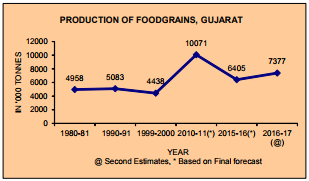Gujarat agricultural growth now just 1.5%, says top economist; it was preceded by negative growth in 2014-16
 |
| Prof YK Alagh |
Even as Union finance minister Arun Jaitley has claimed, while belatedly releasing the party’s manifesto, that Gujarat has recorded “an average growth rate of 10% in the last five years… at a time when there was no boom in the global or national economy”, veteran economist Prof YK Alagh has told Counterview that the growth rate for agriculture at constant prices (discounting inflation) has been about 1.5% over the last two years.
Known to be one of the topmost Indian experts on Indian agriculture, Prof Alagh said, “The Gujarat government and the Government of India have still not released the figures of agricultural growth rate at constant prices. However, whatever I could gather on the basis of the documents released by the state government, I think, the growth rate shouldn’t be more than 1.5%.”
Prof Alagh said, earlier, the state averaged “reasonably good rate of growth” between 4.5 and 6%, thanks to the availability of Narmada waters, which was widely used by farmers across the state, adding, however, “Progress in agriculture of late appears to have been tardy.”
Significantly, Jaitley, while releasing the manifesto, did not say whether the 10% rate of growth was at constant prices (discounting inflation) or at current prices (which includes rate of inflation).
The Gujarat government’s “Socio-Economic Review”, one of the budget documents released in February 2017, providing the actual figures of the Gross State Domestic Product (GSDP, at 2011-12 prices), said that GSDP for agriculture in 2011-12 was Rs 98,015 crore. It went down by a whopping 16.01% in 2012-13, but bounced back to reach 1,07,483 crore in 2013-14, up by 30.57%.
 |
| GSDP for agriculture: Socio-Economic Review, February 2017, Gujarat government |
However, thereafter, the figures show, the GSDP for agriculture decelerated in the next two years – Rs 1,06,246 crore in 2014-15, a fall of 1.15%, and Rs 1,04,138 crore in 2015-16, a fall of 1.98%. GSDP -- let alone for agriculture -- has so far not released any figures for fiscal 2016-17.
Meanwhile, talking with the media on the BJP election manifesto on Monday, Prof Hemant Shah, an economist-publicist attached with the non-political Loshahi Bacho Andolan (Save Democracy Movement), claimed, the figure of 10% rate of growth that Jaitley was speaking about was “at current prices, and if this figure is true, the actual growth, discounting inflation, would be around 5%.”
An expert on rural issues who teaches economics in a college attached with the Gujarat University, Prof Shah continued, “I don’t know the actual figures, but I doubt if the state government would have achieved even this rate. It has been involved in massively manipulating agricultural growth.”
He explained, “The actual growth in agriculture is calculated on the basis of the usage of water for irrigation, a practice which Narendra Modi, as Gujarat chief minister, stopped in 2004. Thereafter, the agricultural rate of growth has all been a guesswork, guided by political exigencies.”
Meanwhile, talking with the media on the BJP election manifesto on Monday, Prof Hemant Shah, an economist-publicist attached with the non-political Loshahi Bacho Andolan (Save Democracy Movement), claimed, the figure of 10% rate of growth that Jaitley was speaking about was “at current prices, and if this figure is true, the actual growth, discounting inflation, would be around 5%.”
An expert on rural issues who teaches economics in a college attached with the Gujarat University, Prof Shah continued, “I don’t know the actual figures, but I doubt if the state government would have achieved even this rate. It has been involved in massively manipulating agricultural growth.”
He explained, “The actual growth in agriculture is calculated on the basis of the usage of water for irrigation, a practice which Narendra Modi, as Gujarat chief minister, stopped in 2004. Thereafter, the agricultural rate of growth has all been a guesswork, guided by political exigencies.”
 |
| Source: Socio-Economic Review, February 2017 |
Prof Shah continued, a major reason for the poor show in agriculture in the recent past is, though 52 lakh farmers and 68 lakh agricultural labourers, in 1.2 crore people, are directly associated with farm activities, and 3.6 crore population is (55% of the state) are dependent on agriculture, yet farming is not proving to be sustainable.
“Not only farmers do not get a viable price for their agricultural produce, ruining farmers, leading to suicide cases, a farmer family, an average, earns just about Rs 6,426 per month. Worse, its income attributable from farming is less than half, only Rs. 3,078. The remaining income is earned from animal husbandry and salary from sundry labour and miscellaneous tasks”, Prof Shah underlined.
“Not only farmers do not get a viable price for their agricultural produce, ruining farmers, leading to suicide cases, a farmer family, an average, earns just about Rs 6,426 per month. Worse, its income attributable from farming is less than half, only Rs. 3,078. The remaining income is earned from animal husbandry and salary from sundry labour and miscellaneous tasks”, Prof Shah underlined.

Comments
The govt. frittered away the opportunity of increasing investment and bungled with ideas of pomp and show like 'rath and yatra.